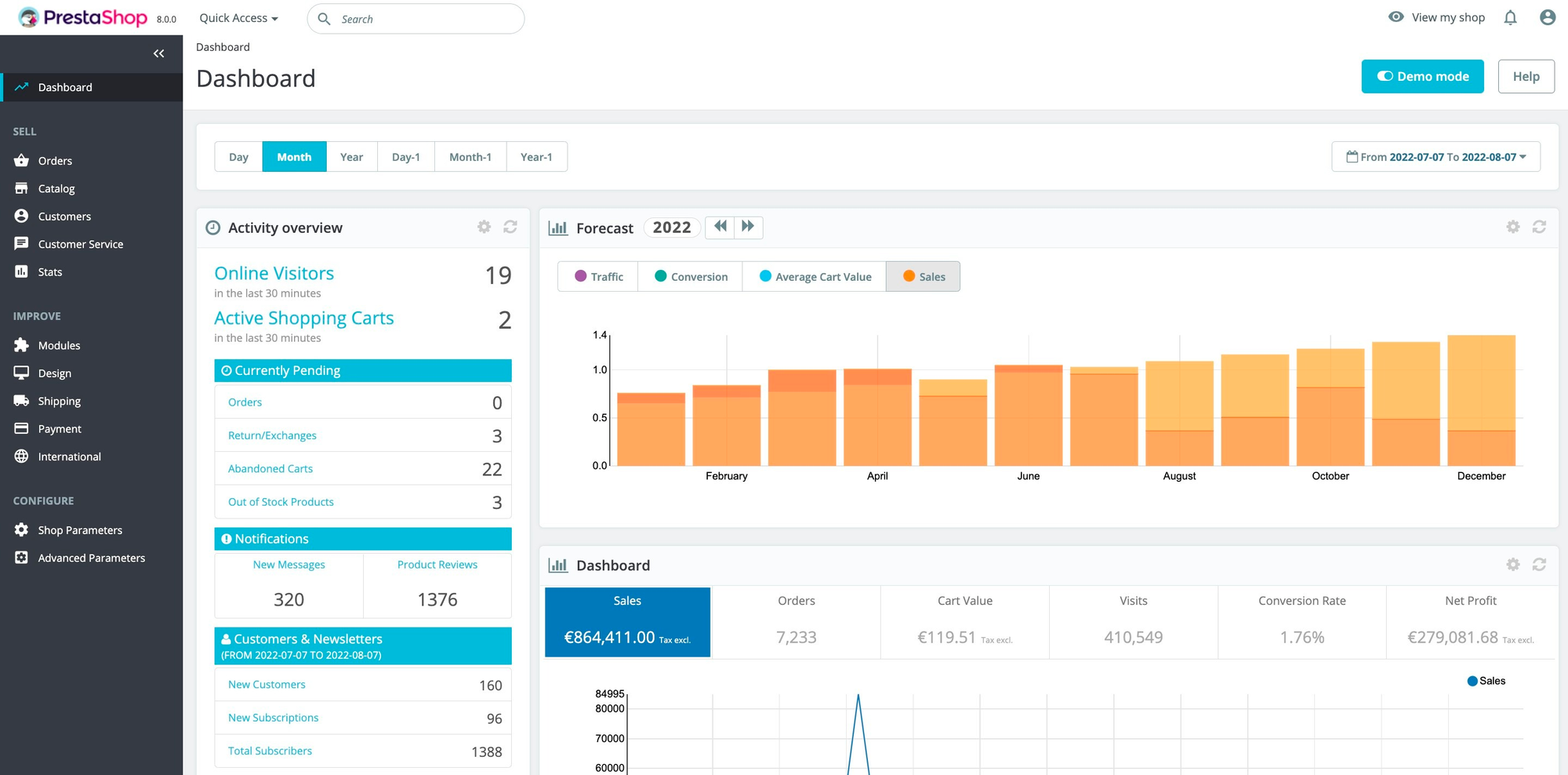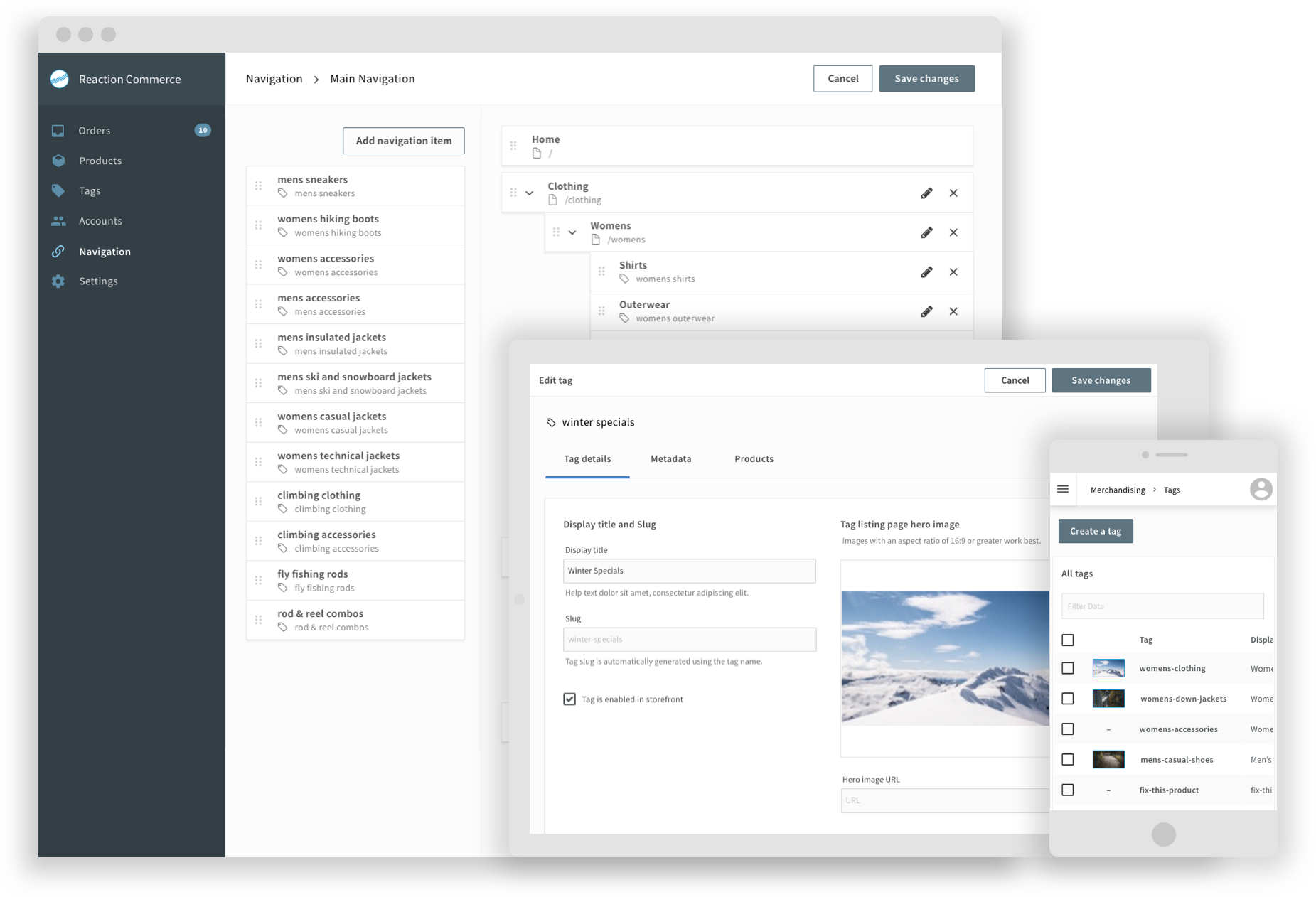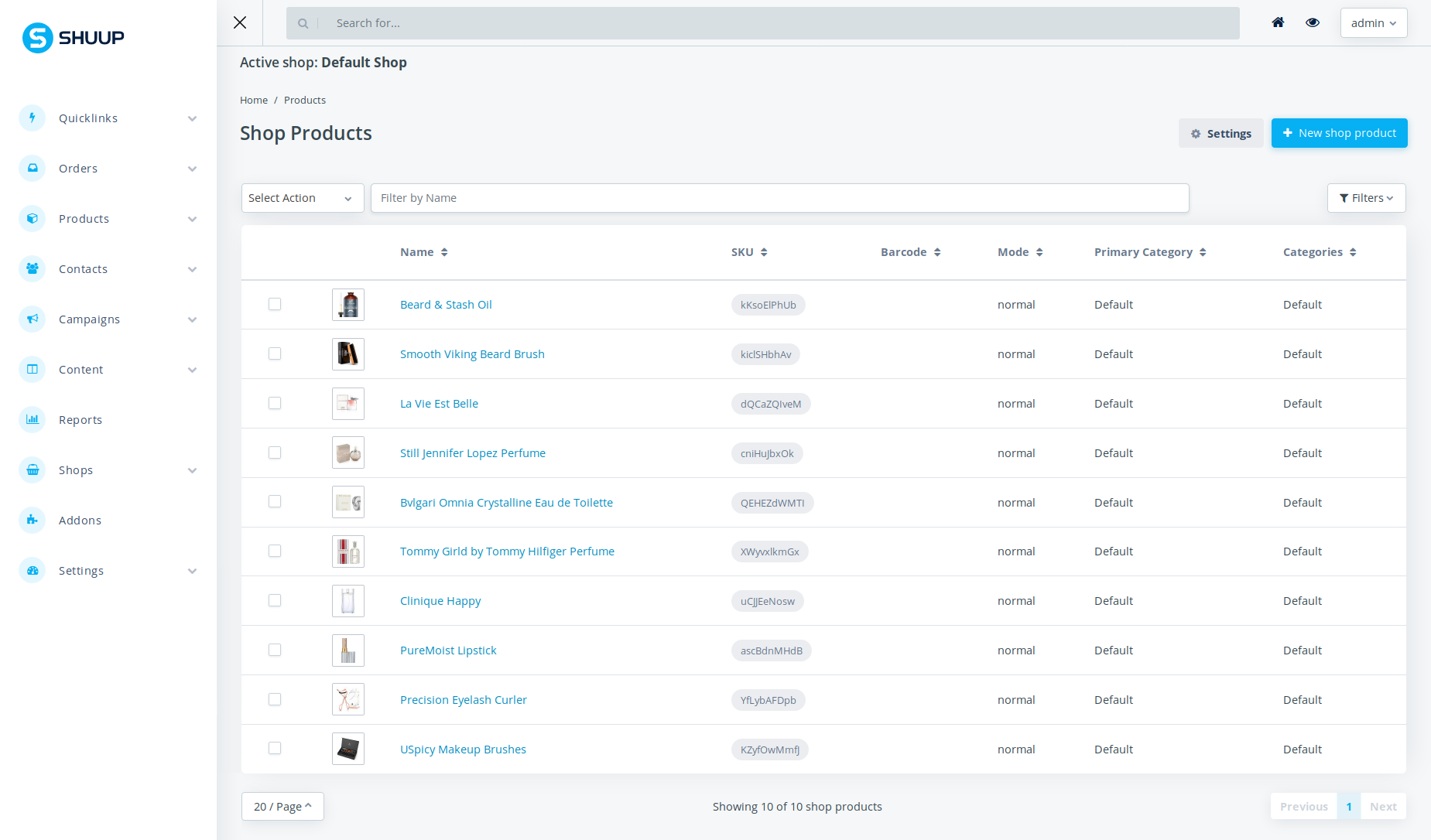Finding The Right Open-source eCommerce System, Here is the best 19 options in 2024
Table of Content
As the world continues to evolve digitally, businesses are constantly seeking innovative ways to keep up with the pace. Among the emerging trends that have revolutionized the eCommerce landscape is headless commerce, a relatively new concept that separates the front-end from the back-end of an eCommerce platform.
Along with this, open-source eCommerce CMS systems have also gained popularity due to their flexibility, cost-effectiveness, and extensive community support.
Headless Commerce and Open-Source eCommerce CMS Systems
In a headless commerce system, the front-end or the "head" (the part of the system users interact with) is decoupled from the back-end (where all the data is stored and operations are performed). This separation provides businesses with greater flexibility, as changes to the front-end do not affect the back-end, and vice versa.
Open-source eCommerce CMS systems, on the other hand, are platforms whose source code is available to the public. Businesses can modify and customize these systems to meet their specific needs, giving them more control over their eCommerce platform.
The Benefits of Using Open-Source eCommerce Systems
When it comes to open-source eCommerce systems, the benefits are manifold. They offer:
- Cost-Effectiveness: Open-source systems are typically less expensive than proprietary software, as they do not come with high licensing fees. This makes them an ideal choice for businesses on a budget.
- Flexibility and Customization: With access to the source code, businesses can tailor the system to match their unique requirements, providing a more personalized experience for their customers.
- Community Support: Open-source systems are backed by a community of developers who continually improve and update the software. This means businesses can benefit from the latest technological advancements and can get support from the community when needed.
- Transparency and Security: The transparency of open-source software allows for greater scrutiny, which can lead to more secure and reliable software. The community of developers can inspect, test, and validate the software code, ensuring any vulnerabilities are quickly identified and addressed.
Stay tuned as we explore the top 19 open-source eCommerce systems in 2024, in the following list.
1. Magento
Magento is a user-friendly eCommerce platform that's loved by businesses both big and small. Its open-source technology allows for a highly customizable shopping cart system, giving online merchants the freedom to design and manage their online stores exactly how they want. Magento is chock-full of useful features, including tools for marketing, SEO, and catalog management.
Its flexibility and ability to handle large product catalogs are some of the many reasons why it's a favorite among businesses. Also, Magento's marketplace is filled with plugins and extensions, and it has a supportive community. One of its standout features is the ability to manage multiple stores from a single backend, offering a high level of customization. This makes Magento an ideal solution for businesses aiming to expand and tailor their online presence.
2. Sharetribe

Sharetribe is a versatile open-source platform perfect for constructing and administering online marketplaces. It's adaptable, catering to diverse business models such as product sales, rentals, or service provisions. Key features include commission oversight, multi-vendor management, and ratings and reviews handling.
From a technical standpoint, Sharetribe is crafted on Ruby on Rails and employs MySQL for its database, with frontend components developed using React and jQuery. For user convenience, Sharetribe offers a no-code builder for straightforward modifications and a developer platform for more sophisticated alterations.
3. Solidusio
Solidus is a robust, open-source eCommerce platform built with Ruby on Rails, serving as a solid alternative to other eCommerce systems. It originated as a fork of Spree, providing a stable and highly customizable framework for online stores. Solidus offers a modular architecture with various gems, including solidus_core, solidus_api, solidus_backend, and solidus_sample, allowing developers to tailor the platform to their specific needs.
Solidus, built on the scalable and developer-friendly Ruby on Rails technology, offers a flexible and customizable eCommerce solution. It supports a variety of extensions, including Stripe and PayPal for payment processing, and additional integrations for subscriptions and tax calculations.
The solution is completely community-driven development, mainly managed by Nebulab, guarantees constant advancements and user support. If you're seeking total control over your store's functionality and design, Solidus presents a robust alternative to other eCommerce platforms.
4. Spree
Spree is a flexible, open-source eCommerce solution! Built with Ruby on Rails, Spree is renowned for its adaptability and extensive customization capabilities. It's not just an eCommerce platform, it's a complete toolkit with features ranging from product and order management to comprehensive customer management.
Whether your business is small or large, Spree has you covered. But what makes Spree stand out? It's the modular architecture that allows easy extension and modification. Plus, you're never alone with Spree's active community and comprehensive documentation. Dive into the world of Spree and redefine your eCommerce experience!
5. Bagisto
Discover Bagisto, a revolutionary open-source eCommerce platform built with Laravel and Vue.js. This innovative platform simplifies online store development with a host of features including multi-channel capabilities, localization, and advanced inventory management.
Bagisto also supports headless commerce, enabling highly customizable and scalable storefronts with the power of Vue Storefront and Next.js. Its user-friendly design, comprehensive guides, and vibrant community make Bagisto a popular choice for developers and businesses seeking a flexible, cost-saving eCommerce solution.
6. Saleor
Looking for an unrivaled, flexible, and high-performance e-commerce platform? Discover Saleor! Crafted with the needs of developers at its core, Saleor is an open-source platform offering unparalleled customization options. It's driven by Python, Django, and GraphQL, and boasts a headless architecture, primed for crafting unique web and mobile frontends.
With Saleor, you'll experience efficient data querying through its GraphQL API, and managing your store becomes seamless thanks to a user-friendly, React-based dashboard. It's also packed with premium features like multi-channel support, advanced order and payment systems, and SEO optimization.
If scalability and customization are your goals, Saleor is the undisputed choice for your enterprise.
7. PrestaShop

PrestaShop is an exemplary Open Source e-commerce web application, dedicated to delivering the most superior shopping cart experience for both merchants and customers.
Crafted with PHP, it boasts unparalleled customization potential, seamlessly integrates with all major payment services, and is translated in numerous languages while being localized for many countries. Moreover, it features a fully responsive design for both front and back office.
8. Shopizer
Shopizer is an open-source e-commerce software built with Java. It features headless commerce and a REST API, including components such as catalog, shopping cart, checkout, merchant, order, and customer.
The backend is built with Spring Boot Java, while the administration web application uses Angular, and the frontend application uses React JS.
9. nopCommerce (ASP.NET)

nopCommerce is an exceptional, open-source eCommerce platform, standing tall since 2008. It's absolutely free and boasts an impressive 3 million downloads! Moreover, it's supported by an active developer community of over 250,000 members. It operates on .NET 8 with an MS SQL 2012 (or higher) backend database.
Additionally, nopCommerce is cross-platform, embracing Docker, PostgreSQL, and MySQL databases. To top it off, it enthusiastically supports web farms and multi-factor authentication.
10. Avia
Avia is an open-source e-commerce framework built using Elixir and Phoenix. It is designed to offer a fast, reliable, and highly extensible platform for developing and managing online stores. Key features include support for multi-seller/vendor platforms, extensive customization options, and superb tooling for managing store operations.
Avia aims to make e-commerce development accessible and collaborative, encouraging contributions from developers to enhance its functionality and capabilities. The project is released under the MIT license.
11. Mailchimp Open Commerce

Mailchimp Open Commerce is an API-first, headless commerce platform that uses Node.js, MongoDB, and GraphQL. It is fast, proven, and scalable, with features including a flexible plugin system, multi-tenant hosting, and a variety of product options.
It also offers inventory tracking, shipping and tax integration, and a flexible fulfillment system.
12. Svelte Commerce
Svelte Commerce is an open-source, PWA storefront for any eCommerce platform. It can connect with any eCommerce backend that provides an API, with ongoing work for adaptors for MedusaJS, Shopify, Magento, Woocommerce, Litekart, and Bigcommerce.
It offers both SSR and SPA, is superfast, and freely modifiable. It integrates most essential eCommerce features and requires no significant investment.
13. Vue Storefront (Alokai)
Alokai is a Frontend as a Service solution that simplifies composable commerce, allowing for the easy creation, deployment, and monitoring of ecommerce frontends. It is compatible with any backend that has an API and offers a fully customizable, fully-working eCommerce storefront integrated with your preferred stack.
Used Tech Stack
- Nuxt.js - the Vue.js framework used to build the application
- Next.js - the React.js framework used to build the application
- Alokai Theme - fully functional eCommerce theme based on the Storefront UI library
- Storefront UI - the Vue.js UI components library used to build the frontend application
- Alokai Middleware - the Express.js server used to connect the frontend application with the eCommerce platform and other Integrations
14. Sylius
Sylius is an open-source eCommerce framework built on Symfony, offering high-quality code, strong testing culture, built-in Agile workflow, and exceptional flexibility. Its powerful REST API allows for easy integrations and unique customer experiences across devices, and it utilizes full-stack Behavior-Driven-Development with phpspec and Behat.
15. Thelia
Thelia is an open source tool for creating e-business and eCommerce websites websites and managing online content.
16. WooCommerce
WooCommerce is a WordPress-based system that transform it into a fully functional eCommerce solution.
17. Shupp (Django)

Shupp is an eCommerce system that is built on top of the popular Django web framework.
18. Spree

Spree Commerce is an open-source eCommerce platform that offers full control and customizability. It features a customizable and modular system, allowing for tailored storefronts, order processing, and APIs. It also integrates easily with existing ecosystems through its composable and API-first approach.
Advanced cart functionality, over 30 payment provider integrations, a robust discount system, and options for store credits and gift cards are also included.
19. Solidus (Rails)
Solidus is a free, open-source ecommerce platform built with Ruby on Rails, providing complete control over your store. It is a fork of Spree and includes several gems such as solidus_api, solidus_backend, solidus_core, and solidus_sample. Documentation and guides are available for further information.










